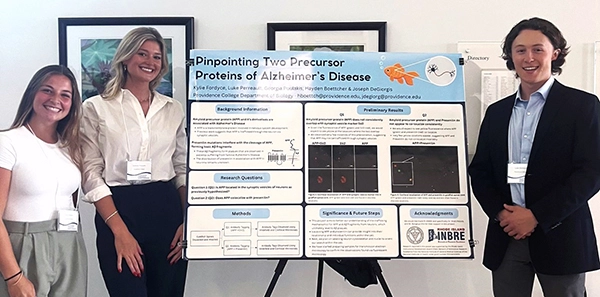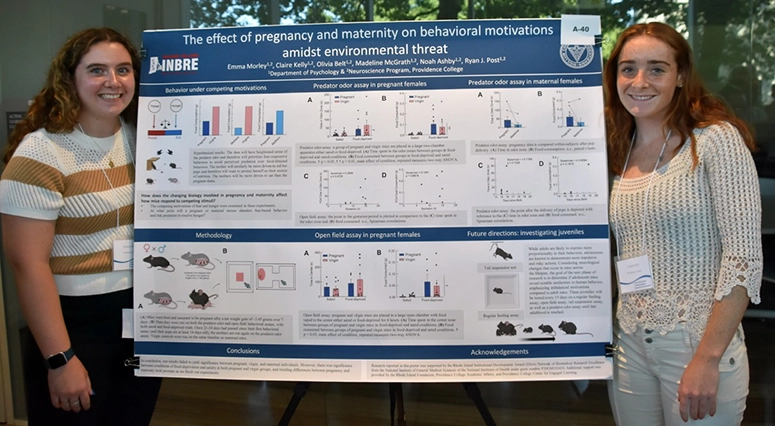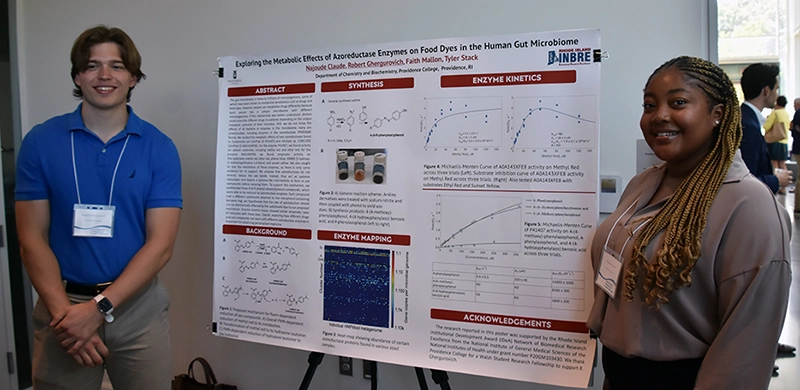Students join faculty members for 10 weeks of summer biomedical research
By Martha Young
Dozens of Providence College students participated in research projects during the summer through grants awarded to nine faculty members by the Rhode Island IDeA Network of Biomedical Research Excellence.
At the end of the July, the student researchers presented their findings at the 2024 RI Summer Undergraduate Research Symposium at the University of Rhode Island.
Here’s a look at three research projects completed during the 10-week program.

Microbiology research on Alzheimer’s disease
Understanding the physiological processes of key proteins and their roles in Alzheimer’s disease was the focus of research by Kylie Fordyce ’25 of Killingworth, Connecticut, and her lab partners, Georgia Poulakis ’25 of Wakefield, Massachusetts, and Luke Perrault ’24 of Naples, Florida.
They worked with Hayden Boettcher, Ph.D., a postdoctoral fellow at PC, and Joseph DeGiorgis, Ph.D., professor of biology, on DeGiorgis’ pilot project, Distribution of the Alzheimer’s Protein Presenilin in the Vertebrate Nervous System.
Fordyce, a biology and psychology double major, said her team’s research focused on the amyloid precursor protein, or APP, and its cleaved form, amyloid beta, a causative agent in Alzheimer’s disease. She explained that both proteins are studied because of their presence in Alzheimer’s, but little is known about the physiological role of APP within a neuron.
By studying the relationship between APP and presenilin, another protein associated with Alzheimer’s, localizing them in the neuron of goldfish spinal cords, DeGiorgis’ team attempted to fill that knowledge gap and understand the proteins’ potential role in causing Alzheimer’s.

Understanding the motivations of survival
Ryan Post, Ph.D. ’14, assistant professor of psychology and neuroscience, received a RI-INBRE Summer Student Training and Research Award for his research project, Neural Pathways of Adaptive Food Intake Under Competing Survival Needs. Assisting him were Emma Morley ’25 of Glen Head, New York, and Claire Kelly ’25 of Cornwall on Hudson, New York.
Their research focused on how the brain manages and prioritizes competing motivations. Kelly, a neuroscience major, focused on the competing motivations of hunger and fear in juvenile and adult mice, while Morley, a biology and psychology double major and neuroscience minor, studied the behavioral motivations in pregnant and maternal mice.
Morley said that the objective of her research was “to learn about changes that occur in behavior and the brain that accompany the hormonal changes in pregnancy and motherhood.” Kelly said her hopes were to “give scientists a greater understanding of the adolescent brain, as well as useful knowledge about how decisions are made in nature.”
One of the important lessons Kelly took from her summer research is that most of the experiences did not yield significant results.
“Many of the hypotheses we made did not prove to be true,” Kelly said. “No significance is still a result and tells us about possible solutions or explanations we did not consider. The experiments we performed provide us with useful information about how we should improve and modify our procedures so that they may capture decision-making more accurately and efficiently in the future. I have learned to trust the process!”

Exploring the human gut microbiome
Robert Ghergurovich ’26 of Stoneham, Massachusetts, and Najoude Claude ’26, of Swampscott, Massachusetts, were among the student researchers working on Exploring the Metabolic Effects of Azoreductase Enzymes on Food Dyes in the Human Gut Microbiome. The research was part of a pilot project, Characterizing Drug and Food Dye Reduction by Promiscuous Gut Bacterial Enzymes, led by Tyler Stack, Ph.D., assistant professor of chemistry.
The team studied the function of certain proteins encoded in the DNA of microorganisms living in the human gut. They tested the proteins to see whether they broke down certain drugs or food dyes at detectable rates. Their hope is that doctors may one day be able to prescribe drugs based on a patient’s unique microorganisms and metabolism.
“Overall, our lab aims to have implications for personalized medicine,” Ghergurovich said. “Because different people have different microorganisms in their gut, certain people may metabolize drugs differently than others.”
Ghergurovich and his student partners said the RI-INBRE summer research experience was invaluable in helping them strengthen lab skills, critical thinking methods, and teamwork capabilities. Morley said she found special value in the opportunity to build her resume for future career opportunities.
“It involves hands-on application of your studies but also utilizes a different type of experience because you must craft a project, troubleshoot any issues, and be flexible as your project changes,” Morley said. “Any employer would appreciate research experience.”





